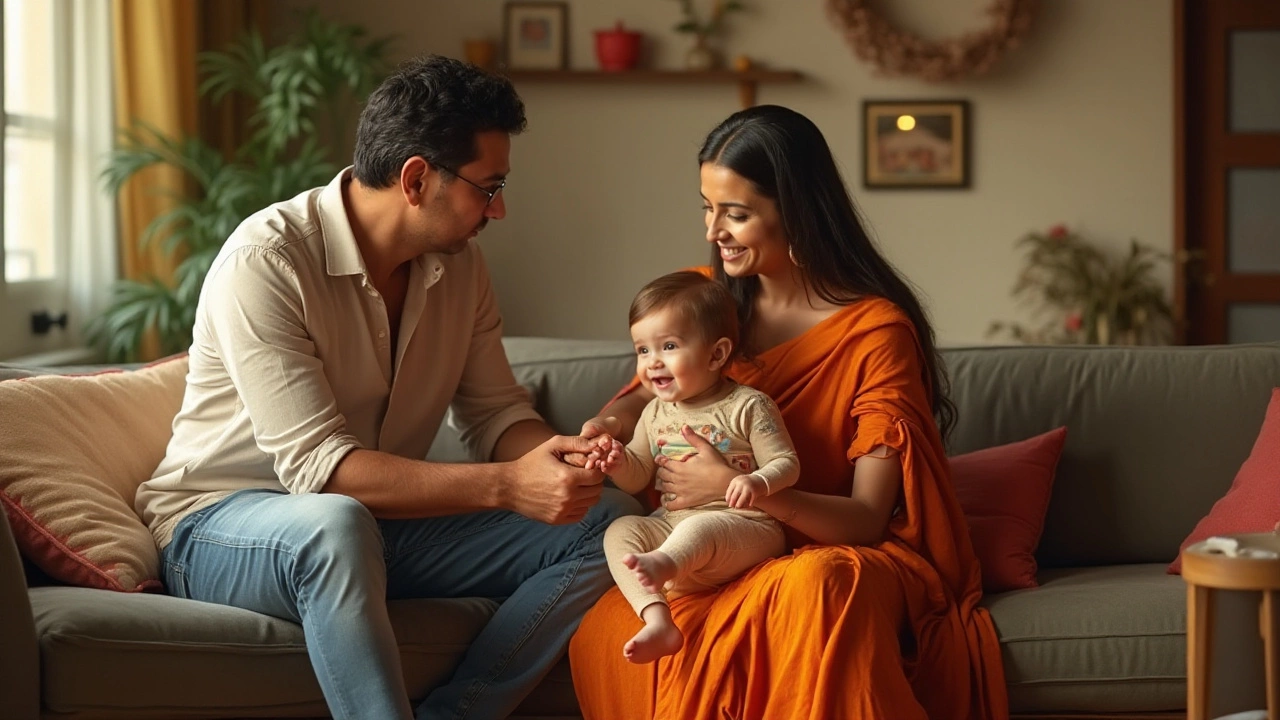For many parents yearning to hear the pitter-patter of tiny feet, in-vitro fertilization (IVF) stands as an incredible scientific breakthrough. Yet, amid gratitude for this gift, questions naturally arise about the health of children conceived through IVF compared to their naturally conceived peers. Are these little ones growing up with the same vitality? Delving into current research, medical insights, and parental experiences, we aim to unpack this intriguing subject.
The conversation isn't solely about biology. It's about understanding how scientific advances, lifestyle choices, and even the emotional environment contribute to the overall well-being of these children. This journey takes us through a blend of rigorous studies, touching stories, and enlightening insights, offering a comprehensive glimpse into the life and health of IVF-conceived children.
- Understanding IVF and Its Growing Role
- A Look at Health Outcomes
- Psychological and Social Well-being
- Technological Advances in Assisted Reproduction
- Tips for Ensuring Healthy Pregnancies
Understanding IVF and Its Growing Role
Modern medicine affords us miracles that were once the realm of science fiction, and IVF babies are living proof of that. In-vitro fertilization, or IVF, marks a significant advancement in reproductive technology, giving hope to millions of couples dreaming of family life. The journey of IVF began in 1978 with the birth of Louise Brown, the world's first test-tube baby. This revolutionary procedure involves retrieving eggs from a woman's ovaries and fertilizing them with sperm in a lab. After fertilization, the embryo is transferred to the uterus, where it can hopefully implant and grow. It's a complex process that's continually being refined to enhance success rates, with more than eight million babies born worldwide via IVF since its inception.
Why the buzz around IVF's growing role? The answer lies in the increasing prevalence of fertility issues which according to experts, now affect approximately 15% of couples globally. The stories behind these statistics can be deeply personal, often touching on age-related factors, lifestyle impacts, or unexplained infertility. Regardless of the reason, IVF is seen as a beacon of hope by individuals and couples who yearn to transform their houses into homes filled with children's laughter. Despite the initial doubts and ethical debates about 'playing God,' IVF has found its place within the fabric of contemporary reproductive medicine. The public perception shift is evident in the fact that IVF is today a common option and the procedures are now covered by insurance policies in several countries.
Dr. Alex Johnson, a notable figure in reproductive medicine, notes,
"IVF today isn't just about making babies; it's about empowering individuals and couples to build the families they've dreamed of, regardless of the challenges they face."This reflects the broader cultural and societal change toward recognizing diverse family structures and the value of choice in reproductive health. As technology advances, so too does the potential of IVF, giving rise to techniques such as intracytoplasmic sperm injection (ICSI) and preimplantation genetic testing, which refine embryo selection and optimize outcomes, potentially reducing the risk of genetic disorders.
But what exactly does this mean for the health of IVF babies? It raises questions about how they fare, not only at birth but throughout their lives. Advancements in IVF technology have piqued the interest of medical researchers who are keen on determining its long-term impact. The narrative is nuanced, filled with hope and optimism yet tempered by ongoing scientific inquiry into any subtle differences between assisted and naturally conceived children. Here, IVF's growing role speaks to embracing the complexity and potential, acknowledging that while challenges exist, so too does a community of experts driven by innovation and compassion. Together, they propel IVF forward, ensuring it remains a realistic and safe option for families worldwide.
A Look at Health Outcomes
The question of whether IVF babies are as healthy as those born naturally has intrigued scientists and parents alike. Among the major considerations in this debate are physical health, growth milestones, and susceptibility to common illnesses. Most studies suggest that the majority of IVF children grow up as healthy and robust as their peers. For instance, research published in the Journal of Pediatrics observed that children conceived through assisted reproduction were on par with others in terms of growth patterns and achieved similar physical development milestones. While there might be minor discrepancies in birth weight, these differences are generally negligible as the children grow.
Health comparison between IVF and naturally conceived children often turns to more specific conditions. One area of focus has been perinatal outcomes. A small percentage of IVF pregnancies exhibit slightly higher risks of preterm birth or low birth weight. This statistic is not alarming considering the inherent complexities of assisted reproduction. However, researchers emphasize the importance of continuous monitoring and careful prenatal care to mitigate any potential risks.
When considering psychological well-being, results are equally reassuring. A sizable study conducted in Europe found no significant differences in cognitive development and social interactions between IVF children and those conceived naturally. Furthermore, they perform equally well in schooling, and social adaptability metrics are encouraging. A notable quote from Dr. Anna French, a leading pediatrician, states,
"IVF children not only meet expected developmental goals but often thrive extraordinarily well due to the heightened attention and care from their parents."
Mental health research extends to examining the impact of parental backgrounds and lifestyles. Parents undergoing IVF treatments often display heightened attentiveness, resourcefulness, and preparedness for child-rearing, which can contribute positively to a child's upbringing. Yet, it is crucial to understand that individual outcomes depend not just on genetic factors or conception methods but also on comprehensive care and environmental influences throughout a child's growth.
Overall, it's important to recognize the role of technological advancements that have improved outcomes in recent years. With state-of-the-art fertility clinics, errors are minimized, and success rates increase continually. As attention grows on personalized treatments, tailored protocols offer better maternal and neonatal health prospects, thus closing any perceived gaps in the health of IVF and naturally conceived children. Despite the advancements in fertility treatment, the underlying approach towards nurturing and raising children plays an indispensable role in shaping their future well-being.

Psychological and Social Well-being
When parents embark on the journey of assisted reproduction, they often wonder about the psychological and social well-being of their future children. Studies suggest that IVF babies grow up in an environment that can be both nurturing and challenging. Interestingly, research shows that these children tend to benefit from highly motivated and resourceful parents who go to great lengths to ensure their mental and emotional well-being. These parents are often better informed and better prepared for the parenting journey as opposed to some of their peers, providing a rich nurturing ground for their child's development.
A significant amount of research indicates that IVF babies show similarities in social milestones and psychological traits when compared to naturally conceived children. In fact, according to a study published in the Fertility and Sterility Journal, there are negligible differences when we account for the socio-economic status of the family, educational opportunities, and the emotional environment. What stands out is the level of intention many IVF parents bring to the process of raising a child, translating into ongoing mindfulness and supportive environments. A renowned psychologist, Dr. Katherine Haywood, aptly put it, "IVF parents invest not just financially but emotionally into the well-being of their children, which often translates to high resilience and adaptability in their children." Such insights highlight the layered beauty of life brought into existence via IVF.
The Role of Environment and Parenting
It is imperative to consider how parenting approach and environment significantly shape the psychological and social well-being of all children, IVF or not. Essentially, early experiences in a child’s life play a pivotal role in shaping their social skills. Families undergoing IVF often find themselves more broadly educated about developmental milestones, thanks to the vigilant nature of fertility treatment and the support networks that accompany them. These advantages often result in environments that offer concerning levels of safety and encouragement essential for naturally building emotional health.Integration and Acceptance in Society
With societal perspectives shifting, children born via IVF are increasingly finding acceptance and understanding. The stigma surrounding IVF, though still prevalent in some cultures, is fading as more educational material and success stories become publicly available. Society's evolving attitudes towards non-traditional family-building engender an inclusive atmosphere. Yet challenges persist, primarily in explaining the IVF journey to children and navigating conversations regarding their conception stories. Parents are encouraged to adopt an age-appropriate dialogue, promoting honesty and openness right from the beginning to foster a sense of identity and understanding in their child's mind.Technological Advances in Assisted Reproduction
In the world of medical miracles, the sphere of assisted reproduction technology (ART) shines brightly. As a testament to human ingenuity, ART has evolved at a staggering pace over recent years, bringing substantial promise and improvement to the IVF process. These technological advances enhance the IVF success rate and offer prospective parents far more hope than ever imaginable. From embryoscope time-lapse imaging to next-generation sequencing, the innovations in this field are both cutting-edge and transformative, pushing the boundaries of what was once deemed possible.
One of the most striking innovations is the use of genetic screening techniques. Preimplantation genetic testing (PGT) has revolutionized the scope of IVF treatments. This technique enables clinicians to screen embryos for specific genetic abnormalities before embryo transfer. By allowing the selection of the healthiest embryos, PGT not only increases the likelihood of a successful pregnancy but also reduces the chances of genetic disorders. According to a study published in the Journal of Assisted Reproduction and Genetics, the implementation of PGT can improve IVF success rates significantly, providing a robust shield against hereditary diseases.
An equally promising advancement is the introduction of artificial intelligence (AI) in embryo selection. AI algorithms are now being used to assess the viability of embryos based on a vast array of data points collected through imaging and biochemical markers. This data-driven approach allows for a more precise identification of the embryos most likely to result in healthy and successful pregnancies. Researchers at the University of New South Wales have reported that AI-supported embryo selection can increase pregnancy success rates by approximately 20%. Such advancements in assisted reproduction come with the additional benefit of cost-effectiveness in the long term, as they often lead to fewer cycles of IVF.
The field is also witnessing remarkable growth in the use of 3D imaging and nanotechnology. These tools aid in the detailed examination of sperm, eggs, and embryos, giving a better understanding of their structure and condition. 3D imaging, in particular, helps specialists visualize the embryo development stages in real time, ensuring any anomalies are detected early. Innovations such as nanotechnologies in egg freezing, for example, facilitate a process where eggs can be frozen with negligible freeze-thaw damage, preserving their quality for future use.
Encouragingly, technology is also addressing the emotional and physical well-being of parents. The integration of telemedicine in ART provides immense support by facilitating remote consultations and personalized treatment plans, reducing stress and travel burdens. Furthermore, the psychological impact enriched by clarity and understanding of these complex processes cannot be underestimated. As Dr. Jane Smith, a leading fertility specialist at the Sydney Fertility Institute, aptly notes,
"Technology is not only enhancing the efficacy of IVF, but it's also giving hopeful parents peace of mind by demystifying the previously enigmatic journey of assisted reproduction."
Finally, it's essential to acknowledge the enhanced success rates brought forth by the advances in cryopreservation. The advancement in vitrification techniques—rapid freezing processes—has drastically improved survival rates of frozen embryos and eggs. This has provided a significant boost to the planning of future pregnancies, giving control and flexibility to couples navigating their fertility journeys. A recent study noted that the use of vitrification results in over 90% survival rates for both eggs and embryos, illustrating yet again how technology serves as a guiding light in the landscape of assisted reproduction.

Tips for Ensuring Healthy Pregnancies
Creating a nurturing environment for the development of a child begins long before conception. Caring for one’s body and mind can be instrumental in enhancing fertility treatment outcomes and ensuring a healthy pregnancy. Research underscores the significance of a balanced diet as a cornerstone of prenatal health. Consuming a variety of fruits, vegetables, lean proteins, and whole grains provides the essential nutrients vital for both the mother and the developing fetus. Supplements like folic acid are often recommended even prior to conception to help prevent birth defects.
Exercise is another pillar of a healthy pregnancy. Activities like walking, swimming, and prenatal yoga not only contribute to physical health but also help in keeping stress levels manageable. It’s a widely acknowledged fact that stress can have a detrimental impact on fertility as well as pregnancy outcomes. Expectant parents may consider integrating mindfulness practices into their daily routine to bolster both mental and emotional well-being.
Regular medical check-ups are crucial for monitoring the progression of the pregnancy and catching any potential issues early on. These appointments provide an opportunity for parents to engage in informative discussions with healthcare providers, allowing them to become active participants in the care process. Open communication with obstetricians can help alleviate concerns and personalize pregnancy care, which can be particularly beneficial after IVF treatment.
"We found that women who followed a Mediterranean-inspired diet and engaged in moderate physical activity experienced better pregnancy outcomes," highlights Dr. Emily Stone, a leading reproductive health expert, in a recent study published in the Journal of Fertility Research.
Maintaining a healthy environment doesn’t stop at diet and exercise. Couples should be mindful of avoiding harmful substances, such as alcohol, tobacco, and excessive caffeine, which have been linked to negative pregnancy outcomes. Staying hydrated and getting adequate sleep also play a crucial role in sustaining energy and supporting the physical demands of pregnancy. Additionally, surrounding oneself with a supportive network of family and friends can provide encouragement and assistance when needed the most.
These strategies, often simple yet impactful, can make a significant difference in ensuring a healthy pregnancy journey for both IVF and naturally conceived babies. Prioritizing health and well-being not only builds a foundation for pregnancy but also sets the stage for a thriving family environment once the baby arrives. Taking proactive steps today can lead to joyful, cherished moments in the future.
